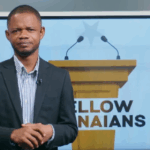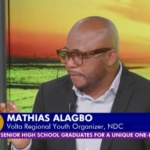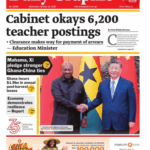
Fellow Ghanaians,
Fifteen of our compatriots are gone. Swept under the cold waters of the Volta Lake. Eleven of them were children, one as young as two years old. Fifteen lives ended not by war, not by plague, but by a country’s persistent negligence. Fifteen human beings, sons, daughters, mothers, fathers, all swallowed by a silence that has become louder than our collective conscience.
It happened last weekend, between Okuma and Bovime in the Krachi West District of the Oti Region. The boat, a small canoe ferrying passengers across the Volta Lake, capsized. Four survived. Fifteen did not. The bodies of little ones, who should have been chasing each other on the red earth of their villages, were instead pulled lifeless from the lake, small hands that once clutched their mothers’ wrappers, now cold and still.
And what has been the nation’s response? Silence. A line in the news. A passing headline. A fleeting conversation. No presidential statement. No national mourning. No outrage. No accountability. Just another tragedy tucked neatly under the endless list of “it happens.”
But it shouldn’t happen. Not like this. Not again. Because this is not the first time. And if we keep pretending, it will not be the last.
In April 2022, seven people drowned when a boat travelling from Dzemeni to Havekope capsized on the Volta Lake. Thirteen others were rescued, but seven never came home. Less than a year later, in March 2023, five more souls perished in the Ada River when their boat capsized between Azizanya and Azizakpe in the Greater Accra Region. Then in May 2023, eighteen passengers lost their lives on Lake Volta after their boat hit a submerged tree stump, a deathtrap that could have been avoided with simple dredging or marked water routes.
June 2024 came with another headline, another heartbreak: eleven people drowned when a service boat capsized on the Oti River near Dambai. Eleven families destroyed in a single day. In August 2025, mourners travelling by boat on the Volta Lake again were caught in a storm. Five dead. Another tragedy in the Volta basin, gone as quickly as it came. And now, October 2025. Fifteen dead. Eleven of them children.
A catalogue of needless deaths. A pattern of preventable grief. A national failure repeating itself with clockwork cruelty. 61 deaths since January 2022, and those are the ones high profile enough to make the news. I will suspect there are so many such deaths unreported.
The Volta Lake, the largest man-made lake in the world, is not just a water body, it is a highway of survival. Thousands rely on it every single day to reach schools, markets, farms, and hospitals. It is their road, their livelihood, their bridge to the rest of Ghana. But for years, the safety of these poor, forgotten Ghanaians has been treated as a footnote in our development agenda.
Where are the life jackets? Where are the safety regulations? Where are the inspectors? Where is the Marine Police Division, the Ghana Maritime Authority, the Volta River Authority, all the alphabet soup of state institutions with responsibility and budgetary allocations for safety on our waterways?
Every time tragedy strikes, officials crawl out of their offices to promise “investigations.” Then they crawl back in, draw their salaries, and wait for the next capsized boat.
Fellow Ghanaians, how did we become so numb to death?
If a bus carrying fifteen people who were public officials or their children crashed on the Accra-Kumasi highway, would we treat it like a side note? Would the President not issue a statement? Would flags not fly at half-mast? Would the media not dedicate wall-to-wall coverage? So why is it that when the poor drown, their deaths don’t count as tragedy, only as inconvenience?
Are their lives worth less because they are poor? Because they were born in communities that can only be reached by water? Because their names are not famous and their parents do not sit in Parliament or in boardrooms? In this country, we have learned to measure the value of life by privilege. We mourn differently depending on who dies. When the elite stumble, the state trembles. When the poor drown, the nation scrolls past.
But these were our people. They sang our anthem. They paid taxes on every matchstick and bottle of water they bought. They voted. They believed in this republic. And the republic betrayed them. The most painful part is that these deaths are not natural disasters; they are policy failures. We know the problems. Every accident report tells the same story: overloaded boats, no life jackets, poor enforcement, unmarked routes, bad weather, no regulation, and no rescue response. The same list, over and over again.
How can a nation surrounded by so many institutions still be so empty of accountability?
And then, after every tragedy, the same official line: “The victims were not wearing life jackets.” How do you wear what you don’t have? How can you enforce a law when the very state fails to supply the basics?
The Ghana Maritime Authority has, on multiple occasions, promised to “intensify education and enforcement.” Yet no one gets prosecuted. No one resigns. No one loses their job. Death comes, and life goes on, for everyone except the dead.
If we truly cared, every boat on our lakes would be registered, inspected, and fitted with life jackets. Every water route would have safety markers. Every district assembly along the Volta basin would have a rescue team. Every captain operating without a license would be prosecuted. But no, we wait until bodies float before we react.
Fellow Ghanaians, we must say it plainly: this is not fate. This is failure, systematic, predictable, avoidable failure.
Fifteen people drowned last weekend, and the country moved on as if nothing happened. No minister has spoken. Not a single high ranking government official has visited the grieving families. No national day of mourning. No urgent statement to Parliament, well perhaps the House is on break. Just silence, loud, deafening silence.
Do lives mean anything here? Does a poor child’s death carry any weight? What kind of nation are we building when the lives of its weakest are treated as expendable?
When we ignore tragedies like this, we are not just indifferent; we are complicit. Every official who looked away, every institution that failed to act, every citizen who shrugged and moved on, we are all complicit. Because silence is approval.
And so, to those eleven little ones whose bodies were pulled from the lake, we failed you. Your country failed you.
You didn’t wish to be poor. You didn’t choose where you were born. You didn’t choose to cross a lake on a leaking canoe instead of driving in an SUV to school. You were born into a country that promised you equality but gave you neglect.
Your parents watched you drown because the state couldn’t be bothered to make your journey safe. You died gasping for air, choking on water, in a lake that should have been your road home.
It’s not easy to drown, you know. The human instinct fights till the very end. Your lungs fill with water, your body convulses, your arms flail in panic. You try to shout but only water enters your mouth. You try to swim but the waves drag you down. For the children, the struggle must have been even shorter, even more painful, tiny hands thrashing against a force they couldn’t understand.
Fifteen lives. Gone in minutes. Dreams erased. A generation cut short. And still, Ghana sleeps.
How many more must die before we learn? How many more boats must capsize before someone in authority realises that “marine safety” is not just a slogan?
We can spend millions attempting to build cathedrals and then airports and interchange after interchange, but we cannot buy life jackets for our people. We can host conferences on “climate resilience” and “disaster preparedness,” but we cannot rescue children from drowning. We can fund political rallies with millions of cedis, but we cannot light a candle for our dead.
Our priorities are broken, Fellow Ghanaians.
If we cared, the government would treat this as a national emergency. It would mobilise the Ghana Maritime Authority, NADMO, the Police, the Navy, the Ministry of Transport, and the Volta River Authority to overhaul water transport safety. It would launch a national water safety program, register every boat, inspect every vessel, mandate life jackets for every passenger, train local captains, and establish rescue centres along the lake. Because this will happen again, unless we act.
It will happen when another overloaded canoe sets sail in bad weather. It will happen when another child boards without a life jacket. It will happen when another poor family must cross a river because their road remains unbuilt.
The question is not if, but when.
And when it happens again, will we still be silent? Will we still call it “fate”?
Fellow Ghanaians, we cannot continue like this. We cannot keep burying our children and pretending it’s normal. The Volta Lake should not be a graveyard for the poor. It should be a symbol of life, of livelihood, of progress. But that can only happen when the state begins to treat every Ghanaian life as sacred, not as expendable.
To the fifteen souls we lost, may your memory haunt us into action. And to the eleven children in particular, rest, little ones. Your country failed you, but may your deaths awaken its conscience.
Good morning, Fellow Ghanaians.
- President Commissions 36.5 Million Dollars Hospital In The Tain District
- You Will Not Go Free For Killing An Hard Working MP – Akufo-Addo To MP’s Killer
- I Will Lead You To Victory – Ato Forson Assures NDC Supporters
Visit Our Social Media for More




